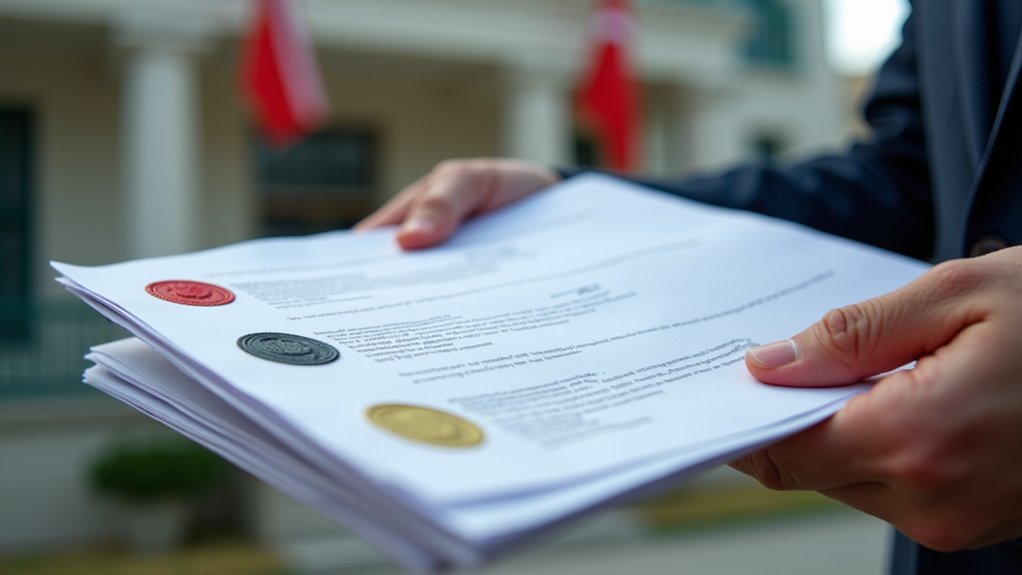Embassy attestation is an essential process ensuring your documents' authenticity for legal use abroad, especially in countries not part of the Hague Apostille Convention. You'll need this attestation to validate documents for visa applications, employment, or educational purposes in jurisdictions like the UAE. The procedure typically involves notarization, local authority verification, and final endorsement by the embassy, taking between 7 to 20 working days. Failure to complete this process can lead to significant delays and complications in your professional or academic pursuits. Understanding these requirements is important for seamless international changes, and further insights await you.
What Is Embassy Attestation?

Embassy attestation is an essential process that verifies the authenticity of your documents for legal use in a foreign country. This procedure becomes particularly important when dealing with documents originating from nations that are not part of the Hague Apostille Convention. In such cases, the attestation process involves several steps, including notarization, local government authority verification, and final endorsement by the embassy or consulate.
Documents must undergo this rigorous verification to guarantee they meet the legal standards of the destination country, thereby safeguarding against the use of fraudulent or tampered paperwork. The entire process can take anywhere from 7 to 20 working days, so planning ahead is advisable.
Embassy attestation is often required for various purposes, such as securing work visas, enrolling in educational institutions, conducting property transactions, or facilitating family sponsorship, particularly in the UAE. Once attested, these legal documents gain recognition across all seven emirates, guaranteeing they hold legal validity and acceptance by UAE authorities indefinitely. By understanding the intricacies of authenticating documents through embassy attestation, you can navigate international processes with confidence and guarantee your paperwork meets all necessary legal requirements.
Importance of Embassy Attestation
Understanding the importance of embassy attestation is essential for anyone traversing the legal landscape in the UAE. This process not only validates your documents for visa applications but also serves as a robust measure against fraud, ensuring that authorities recognize the authenticity of your submissions. By complying with the attestation requirements, you greatly reduce the risk of delays or rejections that could hinder your professional or educational pursuits.
Legal Document Validation
When you need legal documents accepted in a foreign country, the process of embassy attestation becomes essential. This legal document validation guarantees that your paperwork, whether for employment, education, family sponsorship, or business transactions in the UAE, is recognized by local authorities. The attestation process involves several critical steps, commencing with notarization, followed by verification from relevant government bodies, and culminating in certification by the UAE Embassy in your document's country of origin.
Embassy attestation is paramount in safeguarding against the submission of forged documents, thereby enhancing the authenticity of the paperwork you present. Authorities require verified documents to adhere to legal requirements, and failing to complete this process can result in delays or outright rejections of your applications. You must be aware of the documents required for this process, as submitting incomplete or improperly validated paperwork can lead to complications.
Visa Application Requirement
Securing a visa for the UAE hinges on proper documentation, and that's where embassy attestation plays an essential role. Embassy attestation is required for validating the legitimacy of documents necessary for your visa application. This attestation is a significant process, particularly for various visa types, including work, student, family, and dependent visas. It confirms that the documents you submit are legally recognized and accepted within the UAE.
The procedure involves several steps: notarization, verification by relevant government bodies, UAE Embassy attestation, and final MOFA attestation. Each of these steps guarantees that your documents meet compliance with UAE regulations, thereby enhancing the likelihood of a successful visa application. Importantly, the documents that need to be attested must originate from your home country and are valid across all seven emirates, with no expiration date.
Neglecting the embassy attestation process can lead to significant delays or outright rejections of your visa application, underscoring its integral role in the immigration process. To navigate the complexities of obtaining a visa efficiently, confirm that all requisite documents are duly attested, laying a solid foundation for your journey to the UAE.
Fraud Prevention Measures
Completing the embassy attestation process is not just about meeting visa requirements; it also plays an essential role in fraud prevention. By verifying document authenticity, the attestation process considerably mitigates the risk of submitting forged documents in legal transactions, especially within the UAE. This multifaceted verification includes local government checks and foreign diplomatic authentication, ensuring that only legitimate documents are acknowledged.
When you submit verified documents, such as educational certificates or commercial papers, you actively safeguard yourself and your organization against identity theft and fraud. Embassy attestation is mandatory for various visa applications and legal transactions, reinforcing compliance with UAE regulations that uphold the integrity of official documentation.
The stringent requirements inherent in the attestation process serve as a deterrent against fraudulent activities. This fortification fosters trust not only among authorities but also among individuals engaged in documented services. Ultimately, by adhering to this rigorous process, you not only protect your interests but also contribute to a more secure environment for all parties involved. Therefore, embassy attestation emerges as an indispensable mechanism for ensuring the reliability of documents in today's increasingly complex legal landscape.
Step-by-Step Attestation Process
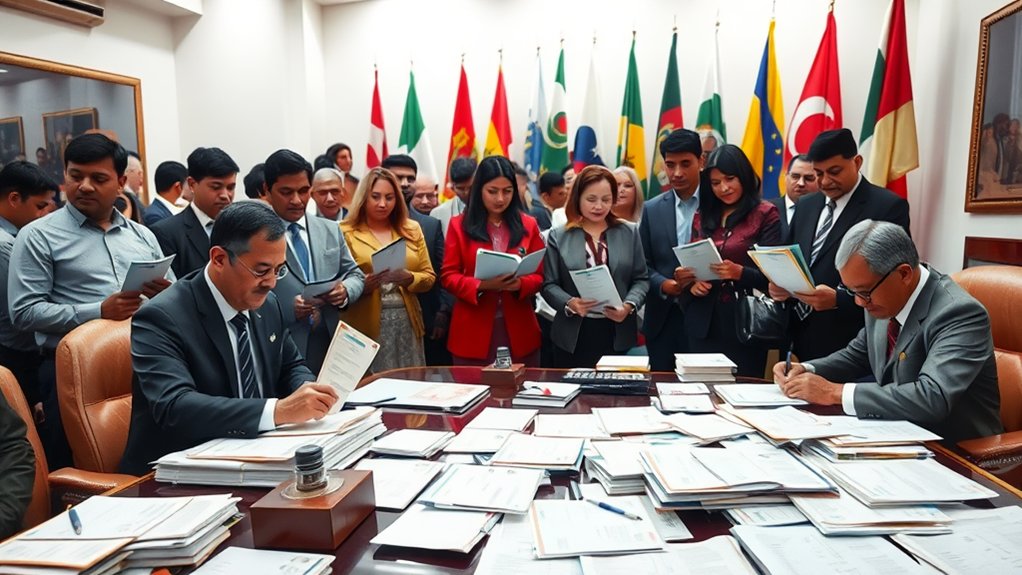
To navigate the attestation process effectively, you'll first need to guarantee your document is notarized by a certified public notary in your home country. Once this step is complete, the document must be authenticated by the relevant government body, typically the Ministry of External Affairs, before it can advance to the UAE Embassy for final verification. This meticulous procedure is essential for the document's acceptance and use within the UAE, underscoring the importance of each phase in the overall attestation journey.
Document Notarization Requirements
Before you can start the attestation process, you'll need to confirm your documents are notarized by a certified public notary. This initial step is essential, as it guarantees your documents are legally recognized and verifies the signatures involved. Below is a simplified view of the notarization requirements:
| Step | Description |
|---|---|
| 1. Notary Public | Engage a certified public notary to notarize your documents. |
| 2. Document Verification | Make certain the notary verifies all signatures and details. |
| 3. Ministry of External Affairs | Submit the notarized document to the Ministry for national-level attestation. |
| 4. UAE Embassy | After verification, the document must be submitted to the UAE Embassy for authentication. |
| 5. Legal Acceptance | The attested document is now ready for verification by the UAE Ministry of Foreign Affairs and International Cooperation. |
Completing this notarization process is critical for various applications, including work visas, educational admissions, and family sponsorships in the UAE. Each step serves to validate the document's authenticity, paving the way for its acceptance in legal procedures.
Government Body Attestation
Once your documents are notarized, the next essential step is government body attestation, which typically involves the Ministry of External Affairs in your home country. This significant phase guarantees that your documents undergo initial verification by the relevant governmental authority, solidifying their authenticity before further processing.
Here's a step-by-step outline of the government body attestation process:
- Attestation by the Ministry: Submit your notarized documents to the Ministry of External Affairs. This attestation by the Ministry confirms the legitimacy of your documentation, a prerequisite for embassy legalization.
- Document Review: The Ministry conducts a thorough review of your documents. This verification by the Ministry is critical in establishing the documents' validity, which is important for subsequent steps.
- Preparation for UAE Embassy: Once your documents receive attestation, they are categorized as attested documents, ready for submission to the UAE Embassy for further verification.
Following these steps guarantees that your documentation is legally recognized in the UAE, paving the way for successful applications, including visas and employment opportunities. Always remember, precise document attestation is essential for a smooth change into your new environment.
UAE Embassy Verification Steps
After your documents have been attested by the relevant government authority, such as the Ministry of External Affairs, the next stage involves the UAE Embassy verification process. This UAE Embassy attestation process comprises five fundamental steps, beginning with notarization by a certified public notary. This initial step guarantees that the authenticity of your original documents is verified before further action is taken.
Following notarization, the documents need to be attested by the relevant government body, affirming their legitimacy. Once this is confirmed, you'll submit the documents to the UAE Embassy for authentication, which serves as a vital foreign diplomatic verification required for recognition in the UAE.
Upon arrival in the UAE, your documents will then undergo final verification by the Ministry of Foreign Affairs and International Cooperation (MOFAIC). This step is significant for confirming that the documents meet all legal standards necessary for acceptance within the jurisdiction of the UAE. Keep in mind that attestation is a process that requires careful attention at each stage to facilitate successful documentation for your intended purpose in the UAE.
Costs and Timeframes
When you're planning for embassy attestation, it's essential to evaluate both costs and timeframes to avoid surprises. Understanding the financial implications and expected duration of the attestation process can facilitate a smoother experience.
- Costs: Embassy attestation fees generally range from $30 to $150 per document, influenced by the specific embassy and the type of document. Additionally, notarization fees can vary from $10 to $50, while government attestation fees typically range between $20 and $100.
- Processing Time: The overall processing time for embassy attestation usually spans 7 to 20 working days. This duration depends on the complexity of the documents involved and the number of items needing verification.
- Mitigation Strategies: To counter potential delays, it's advisable to initiate the attestation process early, ensuring that all documents are complete and accurately prepared.
Apostille vs. Embassy Attestation
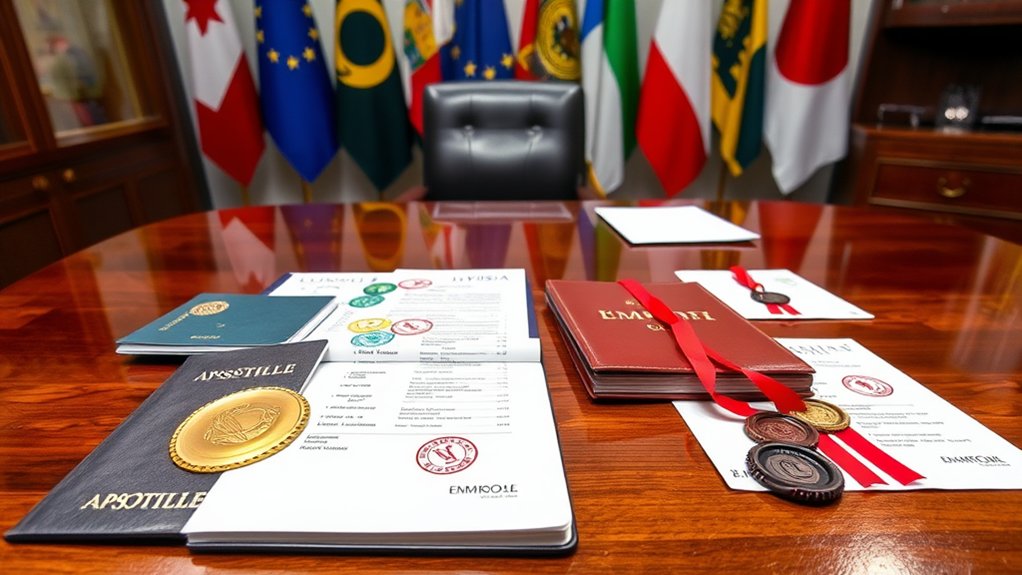
When you're managing international document verification, understanding the differences between apostille and embassy attestation is essential. An apostille offers a streamlined, single-step certification recognized by Hague Convention countries, while embassy attestation involves a more intricate multi-step process for documents from non-Hague nations. By grasping these distinctions, you can guarantee your documents meet the legal requirements of your destination country efficiently.
Definition of Apostille
An Apostille serves as a streamlined certification method under the Hague Apostille Convention, making documents easily recognizable in member countries without the need for additional embassy or consular verification. This single-step certification process simplifies the verification of documents, allowing for quicker legal recognition across jurisdictions.
When considering an Apostille, keep in mind the following key aspects:
- Global Acceptance: Apostilles are accepted in over 120 member countries, facilitating international transactions and legal processes.
- Efficiency: The Apostille process is generally completed within a few days, offering a faster alternative to embassy attestation, which can be time-consuming due to multiple verifications.
- Specific Usage: While an Apostille suffices for countries within the Hague Convention, embassy attestation remains necessary for legal recognition in non-Hague countries, such as the UAE, necessitating additional verification steps.
Embassy Attestation Process
While both Apostille and embassy attestation serve to authenticate documents, they differ considerably in their processes and applications. Embassy attestation is a multi-step procedure vital for obtaining legal recognition in non-Hague Convention countries like the UAE. This verification process typically begins with notarization by a certified public notary, followed by attestation from the relevant government authority. Subsequently, documents must undergo UAE Embassy attestation before final verification by the UAE Ministry of Foreign Affairs and International Cooperation (MOFAIC).
In contrast, Apostille is a streamlined, single-step certification recognized by Hague Convention member countries, making it a faster option. The embassy attestation process is significantly more complex and time-consuming, often taking between 7 to 20 working days to complete. For educational documents, the process includes initial verification by the Ministry of Education, followed by the Ministry of External Affairs, culminating at the UAE Embassy.
It's essential to note that the specific requirements and steps for embassy attestation can vary based on the document type—be it educational, non-educational, or commercial—and the regulations of your home country. Utilizing professional attestation services can simplify this intricate process considerably.
Key Considerations for Legalization
Before you commence the embassy attestation process, it's vital to contemplate several key factors that can greatly impact the outcome. This mandatory process is essential for validating documents intended for legal purposes, guaranteeing that your documents are verified and accepted by the relevant authorities in the UAE.
Consider these key aspects:
- Document Requirements: Verify if your documents necessitate apostille or embassy attestation. Apostille applies to Hague Convention member countries, while non-member countries require embassy attestation.
- Preparation: Confirm all documents are complete and correctly notarized before initiating the process. Incomplete documentation can lead to unnecessary delays.
- Timeline: The process involves multiple steps, including notarization, verification by home country authorities, and final attestation by the UAE Embassy. Anticipate a timeframe of 7 to 20 working days to complete the entire process.
Definition of Certificate Attestation
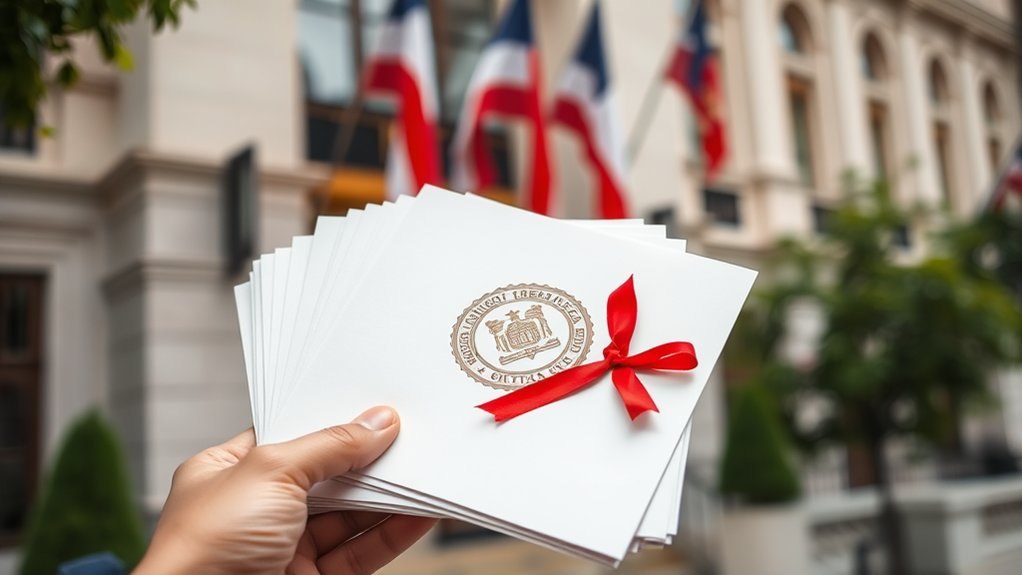
Certificate attestation serves as an integral verification process that confirms the authenticity of your documents through official government channels. This process is vital for guaranteeing that your documents are recognized for legal use abroad, particularly in jurisdictions such as the UAE. During the attestation process, government authorities meticulously verify the legitimacy of your documents, which may include educational certificates, marriage certificates, and commercial documents.
Typically, the process begins with notarization, followed by verification from relevant government departments, and culminates with attestation by the UAE Embassy. Each type of document requires specific steps tailored to its nature, thereby reinforcing the need for a thorough understanding of the requirements involved.
The final verification often involves the Ministry of Foreign Affairs in the UAE, which solidifies the document's acceptance for official use within the country. By completing the certificate attestation process, you can ascertain that your documents are genuine and meet the necessary criteria for employment, education, and visa applications. This proactive approach prevents the submission of fraudulent documents, ultimately safeguarding your interests in international dealings.
Importance of Certificate Attestation
The significance of certificate attestation cannot be overstated, especially when traversing the complexities of international documentation. When you're applying for a visa in the UAE, understanding that certificate attestation is mandatory is essential. This verification process guarantees that your documents are genuine and meet local legal standards, safeguarding you from potential identity theft or fraud.
Here are three key reasons why certificate attestation is vital:
- Compliance with UAE Regulations: The attestation process is mandatory for various visa applications, including those for work, study, and family reunification. It guarantees all foreign documents are recognized by local authorities.
- Protection Against Fraud: Attestation guarantees the authenticity of documents, greatly reducing the risk of fraudulent claims and enhancing trust in the legitimacy of the paperwork presented.
- Streamlined Administrative Processes: By confirming that your legal documents are valid, the attestation process facilitates smoother interactions with local authorities, expediting administrative and legal procedures.
Failing to obtain proper UAE attestation can lead to significant delays or outright rejections of your applications, underscoring the importance of this essential verification step.
Attestation Process for Educational Documents
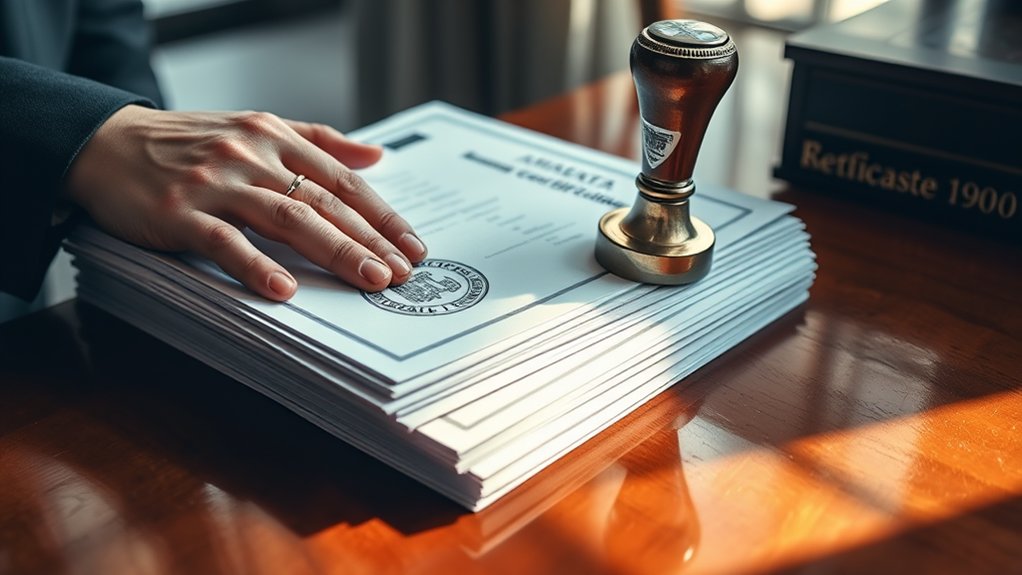
When you're preparing to study or work in the UAE, understanding the attestation process for educational documents is crucial. This process begins with obtaining HRD or SDM attestation, which serves as the initial state verification of your original certificates. After state verification, your documents must be attested by the Ministry of External Affairs (MEA) for central government validation before being presented to the UAE Embassy for further verification.
Upon receiving the UAE Embassy attestation in your home country, the final step requires attestation from the UAE Ministry of Foreign Affairs and International Cooperation (MOFA) once you arrive in the UAE. Common educational documents that necessitate attestation include degrees, diplomas, and transcripts, which are essential for student visa applications and employment opportunities within the UAE.
Here's a summary of the key steps in the attestation process:
| Step | Description | Timeframe |
|---|---|---|
| HRD/SDM Attestation | State verification of original educational documents | 2-5 working days |
| MEA Attestation | Central government validation | 2-7 working days |
| UAE Embassy Attestation | Verification by the UAE Embassy | 3-10 working days |
| MOFA Attestation | Final attestation in the UAE | 1-3 working days |
Understanding these steps guarantees you navigate the attestation process smoothly.
Common Issues in Attestation
Many individuals encounter common issues during the attestation process that can lead to delays or even rejections. Understanding these pitfalls is essential to guarantee a smooth embassy attestation experience.
- Incomplete Documentation: Failing to prepare all required documents can greatly hinder the legalization process, resulting in unnecessary delays.
- Incorrect Notarization: Using a notary unfamiliar with the attestation process may render your documents invalid. It's imperative to engage certified public notaries who understand the specific requirements tied to your document type.
- Improper Sequence of Attestations: Each document must follow a particular sequence during the attestation process. For instance, educational documents often require HRD/SDM attestation, while commercial documents need Chamber of Commerce approval. Omitting any step can lead to rejection.
Additionally, keep in mind that processing times can vary, typically ranging from 7 to 20 working days, influenced by document complexity and the efficiency of the involved authorities. Furthermore, attestation requirements differ based on nationality, necessitating strict adherence to regulations to avoid complications. Awareness of these common issues will empower you to navigate the embassy attestation process more effectively.
Reliable Attestation Services in UAE
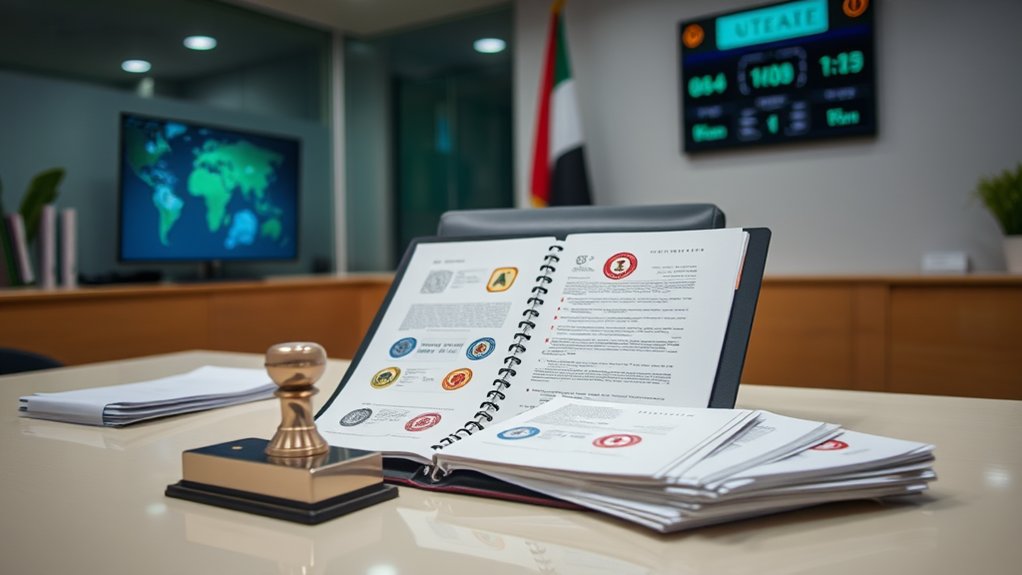
Maneuvering through the attestation process can be intimidating, but reliable attestation services in the UAE simplify it by guaranteeing your documents comply with local regulations. These services streamline the complex process that involves various types of documents, including educational, non-educational, and commercial certificates.
| Feature | Benefits |
|---|---|
| Online Tracking | Monitor your documents in real-time, providing peace of mind. |
| Comprehensive Support | Complete assistance from notarization to UAE Embassy verification. |
| Expert Guidance | Reduce risks of delays due to incomplete documentation. |
With professional attestation services, you can expect efficient handling of your legal documents, including final legalization through the Ministry of Foreign Affairs (MOFAIC). Such services also facilitate the verification process at the UAE Embassy, guaranteeing all necessary requirements are met before submission.
Costs for attestation services in the UAE vary based on the document type and processing speed, typically ranging from AED 150 for basic MOFAIC attestation to higher amounts for additional steps. By opting for these reliable services, you not only save time but also guarantee that your documents attested are processed accurately and promptly.
Frequently Asked Questions
Why UAE Embassy Attestation Is Required?
You need UAE embassy attestation for document verification, ensuring your educational qualifications and employment opportunities are recognized. It's crucial for securing a UAE visa and maneuvering legal procedures essential for international travel and residency.
What Is the Meaning of Embassy Attestation?
Imagine your documents sailing smoothly across borders! Embassy attestation means verifying your legal documents—like educational certificates, marriage certificates, and employment letters—for international travel, ensuring they're accepted in another country. You can't overlook this essential step!
What Is the Purpose of Attestation?
The attestation process guarantees document verification, confirming legal significance for international acceptance. It's essential for educational credentials and employment requirements, preventing fraud and safeguarding your interests when managing official procedures in foreign countries.
How Much Does an UAE Attestation Cost?
When you explore UAE attestation fees, consider a cost comparison analysis of attestation service providers. The total can range from $30 to several hundred dollars, influenced by document verification processes and embassy requirements overview.
Conclusion
In conclusion, embassy attestation is an essential process that validates documents for international use, often required for employment or education abroad. Significantly, approximately 70% of applicants encounter challenges during this process, underscoring the importance of understanding the intricacies involved. By maneuvering through the attestation process with diligence and the right support, you can guarantee your documents meet necessary legal standards, thereby facilitating a smoother shift into your global endeavors. Trust in reputable services to streamline this fundamental undertaking.

